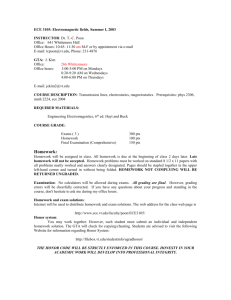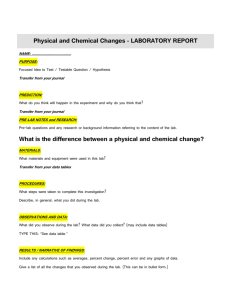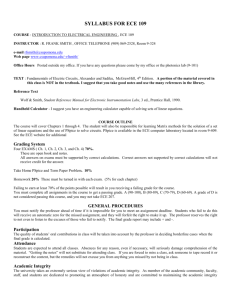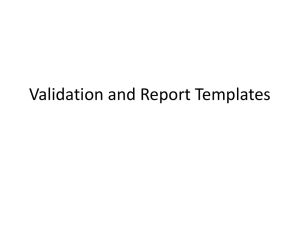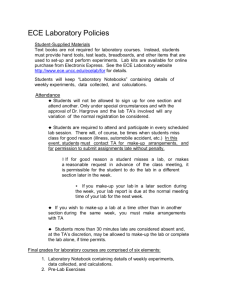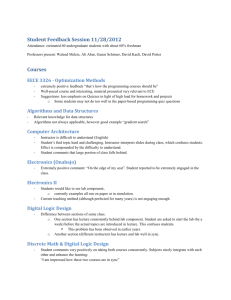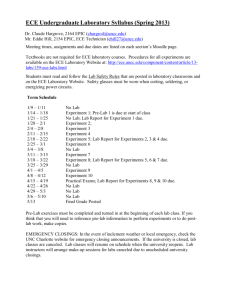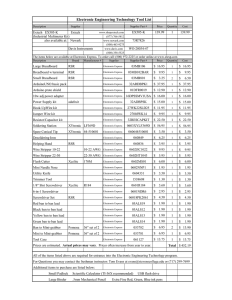ECE 2074
advertisement
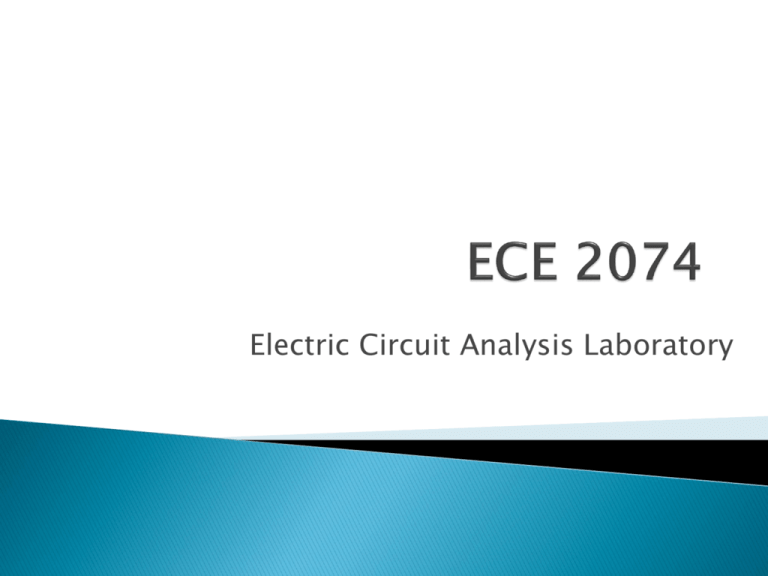
Electric Circuit Analysis Laboratory Dr. Kathleen Meehan, the course instructor ◦ Room 460 Whittemore Hall ◦ kameehan@vt.edu or kathleen_meehan (Skype) Leydi Zora, the lab GTA ◦ ltzora@vt.edu or ECE2074 (Skype) ◦ She will oversee the circuit validations and provide technical help. Tentative hours have been posted on the cours Scholar site. The lab website is www.opel.ece.vt.edu Hardware [known as Lab-in-a-Box (LiaB)] ◦ Includes ANDY Board from Electronix Express A two-channel oscilloscope with function generator Either the Velleman PCSGU250 from Electronix Express or the Analog Discovery with BNC adapter from Digilent, Inc. A digital multimeter, MY64 from Electronix Express is recommended Test cables/Probe kit Set of tools (at a minimum, a wire stripper) Parts kit will be supplied by the ECE department ◦ Link to Electronix Express and Digilent, Inc. are provided at www.opel.vt.edu Lab Manual ◦ Lab-in-a-Box: Introductory Experiments in Electric Circuits, revised 3rd Edition by R.W. Hendricks and K. Meehan The ECE Department provides a parts kit to any student in ECE 2074 who has not already received one. Note that the ECE 2504 parts kit is different from the ECE 2074 kit. ◦ If you do not have a parts kit, contact Dr. Meehan immediately via email. Include a mailing address if you are unable to come to Virginia Tech to pick it up. We will distribute, as quickly as possible, any missing components. Please check your parts kit to verify that you have all of the parts. A list of the partsk is posted at http://www.opel.ece.vt.edu/reference/PartsKits.html ◦ If you find that you are missing components, contact Dr. Meehan immediately via email with a list of the components missing. Include a mailing address if you are unable to come to Virginia Tech to pick it up. Pspice ◦ Version 9.1 (preferred) https://computing.ece.vt.edu/wiki/PSpice_FAQ ◦ Version 10 from CD included in J.G. Tront’s book ◦ Version 16.2 MatLab software program ◦ Available in Freshman Engineering software bundle (http://www.ita.vt.edu/studentsoftware/website/pr oducts/stuproductinfo.183.html) ◦ Contact SW.A.T. Team if you have problems MATLAB Forum on Scholar ◦ Open to all Virginia Tech students and serves as a resource for students who are having difficulties using MATLAB in their coursework or research. ◦ To join: Click on My Workspace tap in Scholar. Then, click on Membership located on the laefthand toolbar. Search for “MATLAB forum” afterclicking on Joinable Sites. After you join the site, it will appear in your Projects list on Active Worksites. MathWorks has an extensive set of tutorials on their website (www.mathworks.com). There are also a number of tutorials written by others readily available on the internet. ECE IT staff will assist with issues with the installation of PSpice and the oscilloscope software. ◦ Branden McKagen 346 Whittemore Hall, mckagen05@vt.edu ◦ John Harris 348 Whittemore Hall, john.harris@vt.edu SWAT deals with any Issues with MatLAB and other software in the Freshman Engineering bundle ◦ http://www.swat.eng.vt.edu/index.html or swat@vt.edu Leydi Zora, who will be in the OpEL, assists with technical issues about the construction and measurement of the circuits and will validate your circuits with you. ◦ ltzora@vt.edu or ECE2074 (Skype) Contact Dr. Kathleen Meehan with questions about ECE 2074 course policies and grading issues. ◦ If you ask me for help with PSpice or MATLAB, please email me your .sch or .m file. Lab Experiment in Lab Manual 1 1&3 Pre-Lab Report (by 11pm) Due Date Lab Validation (by 4pm) 6/5/2013 6/7/2013 PostValidation Report (by 11pm) 6/9/2013 6/12/2013 6/14/2013 6/16/2013 2 4 6/19/2013 6/26/2013 7/3/2013 7/10/2013 6/21/2013 6/28/2013 7/5/2013 7/12/2013 6/23/2013 6/30/2013 7/7/2013 7/14/2013 3 4 5 6 To be distributed 8&9 7 12 7/17/2013 7/24/2013 7/31/2013 8/7/2013 7/19/2013 7/26/2013 8/2/2013 8/9/2013 7/21/2013 7/28/2013 8/4/2013 8/11/2013 7 8 9 17 Title Weight Breadboard Basics and Ohm’s Laws Kirchhoff’s Laws / Equivalent Resistance Wheatstone Bridge Superposition Wye-Delta Transformation A Non-Inverting Amplifier Circuit TBA A Differentiator Circuit TBA TBA 10% 10% 10% 10% 10% 10% 10% 10% 10% 10% Syllabs Announcements Models link on the left-hand toolbar ◦ Collection of materials for each week’s lab Powerpoint slides with background material, changes to the lab manual procedures, etc. Report templates Validation instructions Support documentation Assignments link ◦ Links to upload pre-lab and post-validation lab reports Gradebook Resources – technical information/tutorials on equipment, Pspice, and MATLAB Forums – questions and answers about each lab Labs Pre-lab report Validation Report Online Quizzes, etc. Total 20% 30% 40% 10% 100% Note: 1. No credit will be given for any lab that has not been validated. 2. No credit will be given for a validation that is not performed by the end of office hours on the Friday on which the experiment is due. 3. There will not be make-up labs 4. Late submissions will be accepted, but not graded, unless there is a valid excuse. Each of the ten labs (12 experiments in total) are weighted 10% each. ◦ You will have some work, described in the Analysis and modeling section of teach Experimental Procedure that must be done and uploaded as the pre-lab report on to Scholar by the Wednesday of the week in which the experiment is due. This work must be done before the circuit can be validated. The post-validation report will include the information provided in the pre-lab report and must be uploaded by the Sunday that the experiment is due. Is the process where you demonstrate to the operation of your circuit to the course GTA to show that you can perform the required calculations, simulations, and measurements. ◦ Each student must sign up for a time to validate their experiment with the course GTA. During the validation, the GTA will ask the student to perform a validation procedure and show their pre-lab report. No credit will be given for lab validations attempted after the deadline for each lab. ◦ We strongly encourage you to get the validations done early. Each student must be able to connect with video (i.e., you must have a webcam). It is your responsibility to insure that the GTA can see you make the measurements. ◦ Learn to position your webcam so that your breadboard is in focus, that the LCD screen of your digital multimeter is visible, and that you can share your computer screen with the GTA. ◦ Make sure that you are in a well lite room. Watch for glare off of the breadboard and digital multimeter – diffused lighting rather than a lamp directly shining on these two pieces of equipment is best. Report templates, which are Excel files, will be provided for all experiments except design experiments. ◦ For the pre-lab reports with the templates, you must complete the Analysis, PSpice, and Sample Calculations Excel worksheets. You may submit the entire Excel file. ◦ For the post-validation reports, you will submit all of the worksheets in the report template including the ones that you submitted for the pre-lab report. Please do not modify the format of the Excel file. Lab reports will be graded on correctness of answers as well as issues such as formating of the answers (3 significant figures, spacing between numerical answers and units, appropriate use of prefixes on units, etc.). ◦ Please follow the guidelines on entering data in the Excel files. Validation grades will be based upon your ability to perform the requirement measurements, the proper performance of the circuit, and your ability to describe the operation of the circuit. All submitted work (both written work submitted via Blackboard and experiments built on the ANDY board and presented for validation) is presumed to be the original work of the student and the Virginia Tech Honor code applies. The validating GTA and the grading GTA will make clear notations on the validation and/or the pre-lab and post-validation reports, if there is any suspicion of copied reports and/or “dry-lab” experiments. In such a case, the suspected work will be sent directly to the instructor. Evidence of cheating, either by submission of a copied PSpice simulations, lab reports, recycled circuits for validation, etc. will be submitted to the Honor Court for appropriate action. Students will receive a grade of X at the end of Summer I. This grade will be converted to a letter grade at the end of Summer II. Even though this course extends over two summer sessions, the deadlines for add/drop and course withdrawal are the same as those used for Summer I. ◦ http://www.registrar.vt.edu/registration/201206_calendar.php Thursday, May 30, is the last day to add the class. Monday, June 10, is the last day to drop ECE 2004 without grade penalty. If you are enrolled in only one course in Summer I, you must officially resign from the university. Your refund will be calculated according to the university refund policy. Monday, June 17, is the last day to resign without grade penalty. First and required contact for resignation is academic dean of the College of Engineering. Submit completed resignation form to the University Registrar's Office by 5:00 p.m. Friday, June 28, is the last day to apply for Course Withdrawal.
